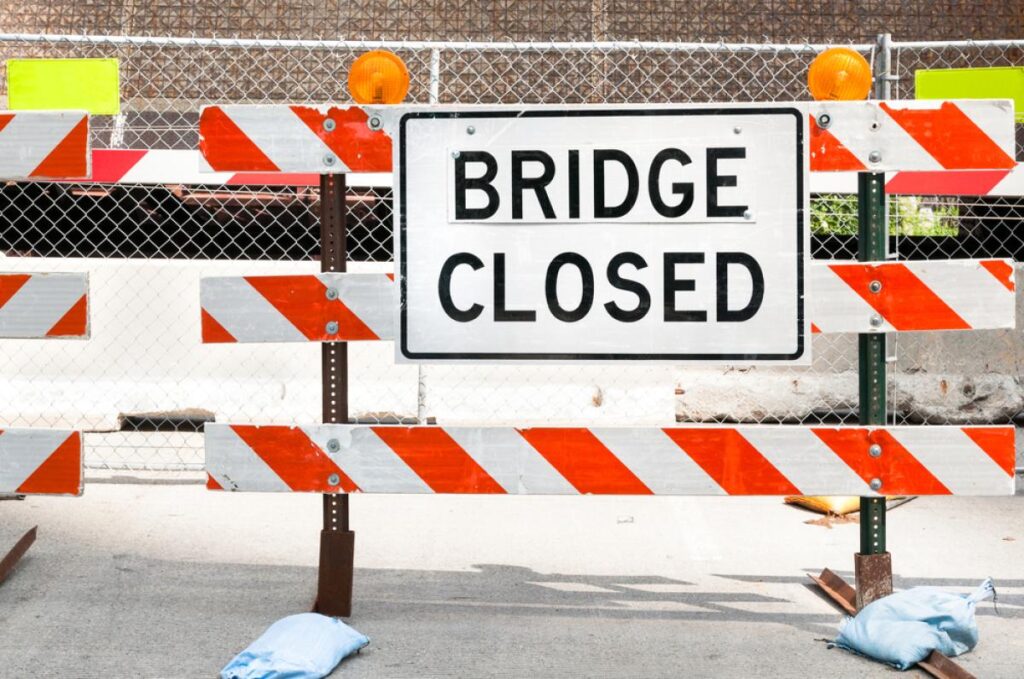Shutterstock photo/Eric Buermeyer
The historic Skinners Falls/Milanville bridge that once carried traffic across the Delaware River between Pennsylvania and New York, but has been closed for the last five years, is set for emergency repairs later this fall to protect boaters and the waters below.
Meanwhile, the Pennsylvania Department of Transportation (PennDOT) is proposing to replace the Calkins Creek bridge next to the Milanville General Store on nearby River Road. Both structures are just a short distance apart in the state’s far northeastern corner.
PennDOT plans to keep one lane open at a time during construction of the Calkins Creek bridge, rather than imposing a long detour.
The old bridge to Skinners Falls on the New York side of the Delaware River, however, will remain shuttered pending a decision on the ultimate fate of the one-lane bridge linking the two states, the Tri-County Independent in Honesdale, Pa. reported Oct. 10.
Bridge Pieces Have Fallen Into the Delaware
On Aug. 2, the Upper Delaware Council (UDC), a two-state group that manages the scenic and recreational river, notified PennDOT of the urgent need for an emergency inspection of the Skinners Falls bridge after heavily-rusted metal parts were seen falling into the waterway by UDC representatives.
As a result, PennDOT announced in late August that it would begin removing some of the loose bridge components, a project that will continue throughout this autumn. Warning signs and buoys will be installed both upstream and downstream of the bridge and temporary protective netting to the superstructure will be erected. The agency undertook emergency procedures to obtain state funding for the netting.
The 1902 suspension bridge, listed on the National Register for Historic Places, was shuttered in 2019 to all traffic, including walkers and bicycles, due to its deteriorating condition. It had undergone emergency repairs several times before, and the structure’s weight limit was lowered twice.
By closing the span, immediate access to emergency services from the New York side was cut off, as well as use by the public.
PennDOT, in coordination with the New York State Department of Transportation (NYSDOT), and the Federal Highway Administration (FHWA), conducted a Planning and Environmental Linkages Study last spring to identify transportation purpose and needs, and weighed various scenarios for the fate of the Skinners Falls bridge, including estimated costs, the Honesdale news source noted.
Among their considerations were:
- Leaving the bridge as is.
- Demolishing and scrapping it.
- Removal and relocation.
- Two degrees of rehabilitation.
- Full replacement.
Public meetings and a survey also have been conducted to help decide what to do with the bridge.
The UDC, which advocates for rehabilitation to retain the bridge’s historic character, commented in its Aug. 2 letter, “[We remain] dismayed over how protracted and costly (at nearly $4 million) this Planning and Environmental Linkages Study has been since the beloved historic bridge was closed to all traffic on Oct. 16, 2019. It’s inevitable that the bridge continues to structurally decay while awaiting the determination of its fate.”
Skinners Falls, in rural Sullivan County, N.Y., is part of the Upper Delaware Scenic and Recreational River system and is maintained by the National Park Service. Just a few yards south of the old span, Sinners Falls also boasts of having one of the most popular river accesses along the Upper Delaware.
Calkins Creek Bridge to Get a New Look
In its Oct. 1 announcement about the Calkins Creek Bridge, PennDOT asked for public comment regarding the proposal to replace the River Road structure, located within walking distance of the Skinners Falls/Milanville bridge.
Once the Calkins Creek superstructure replacement is complete, the new bridge will accommodate pedestrians with a wider shoulder on the upstream side of the roadway, according to PennDOT.
Additionally, the transportation agency plans to powder coat the bridge beams, abutments, wingwalls, and guiderails with the brown color “typically used by the National Park Service,” PennDOT said. The Independent also learned that the state plans to use an architectural surface blue stone pattern for the bridge elevations.
“Scour protection material [rip rap] around the abutments will incorporate local stone that is intended to match the form liner [bridge elevations],” PennDOT explained.
When work gets under way, traffic control will include a single-lane, alternating pattern controlled by temporary signals during half-width construction. PennDOT also will accommodate pedestrians during construction using a designated signal phase to allow them to safely cross the bridge on temporary lanes.
The Milanville General Store on the south end of the bridge is a historic landmark in the Wayne County, Pa. community.
Read the full article here

